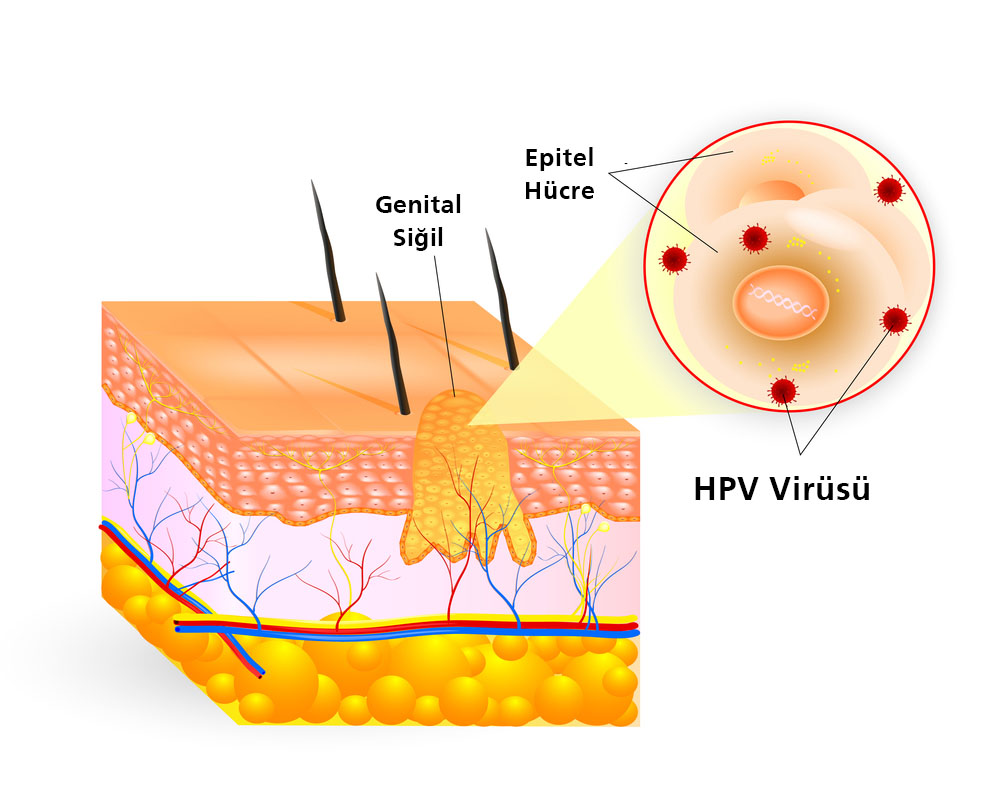Genital Warts (Condyloma) and HPV

In a hygienic clinical environment, we offer the most effective and comfortable treatment options for genital warts using laser, cauterization, and cryotherapy methods.

Genital Warts
The causative agent for “Genital Warts (Condyloma)” seen in both men and women is HPV (Human Papilloma Virus) and constitutes the most common sexually transmitted disease group in the world and in our country. More than thirty types of HPV infect the genital system, but visible lesions (warts) are most commonly caused by HPV Types 6 and 11. Indolent strains such as Types 16 and 18 are most responsible for HPV-related cancers (cervix, penis, anal cancers).
How Is It Transmitted?
"Genital warts are most commonly transmitted through sexual contact (vaginal, oral, or anal). However, transmission without sexual contact is also possible—such as through hand-to-genital contact, sharing razors or underwear, or from mother to baby during childbirth.
When Do Symptoms Appear?
"In the majority of cases (approximately 70%), the infection remains silent (asymptomatic) and does not cause any noticeable symptoms. The incubation period—the time between transmission and the appearance of lesions—ranges from 3 weeks to 8 months.


How is the diagnosis made?
"Diagnosis is typically made by observing papillomatous (cauliflower-like), brown or reddish lesions. In patients without visible lesions, application of 3% to 5% acetic acid to the genital area can reveal condylomas as white patches. HPV DNA testing can be used for subtyping, although it is not commonly performed. Routine biopsy of warts is not generally recommended. However, biopsy is advised in cases of atypical appearance—such as pigmented, firm, or ulcerated lesions—as well as in immunocompromised patients or in lesions that do not resolve after treatment.
Who Should Receive the HPV Vaccine?
The HPV vaccine is recommended for both males and females, typically starting at ages 9 to 12. It can be administered up to age 26 for those who did not receive it earlier. In some cases, individuals between the ages of 27 and 45 may also consider vaccination after discussing it with their healthcare provider. The vaccine helps prevent HPV-related cancers and genital warts.


How Is It Treated?
There is no treatment that can completely eliminate or clear HPV infection from the body. However, 90% of the infections will resolve spontaneously within two years. Strengthening the immune system can increase the chance of the virus being cleared from the body. Even though the virus cannot be eradicated, genital warts can be removed using various methods. If left untreated, these warts may grow and multiply in clusters.
Treatment options include:
Cauterization or laser therapy to burn off the lesions
Cryotherapy to freeze the genital warts
Surgical excision of the genital warts
Women with genital warts should be screened for cervical cancer. Similarly, patients at risk with anal warts (e.g., HIV-positive, transplant recipients) should undergo regular anal cytology screening. Individuals with lesions in the urethra or penis should be examined endoscopically for potential involvement of the urethra or bladder.
